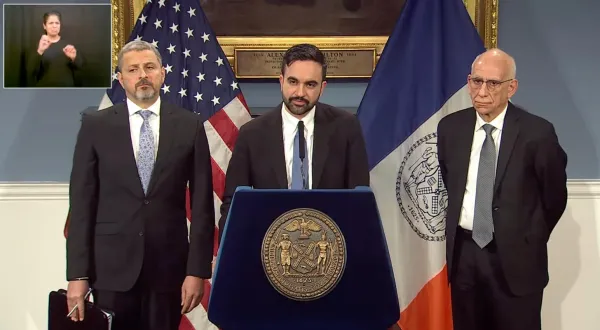BREAKING: Gerry Connolly Resigns As Ranking Member
Democratic Party leadership needs to reckon with its inability to understand when it is time to step aside—because this model is enabling the collapse of our democracy
This is an uncomfortable conversation but it’s one we must have.
Democratic Congressman Gerry Connolly has resigned as Ranking Member of the House Oversight Committee. He cites his health and a cancer diagnosis from six months ago as the reason for his resignation.
Here’s the thing—I genuinely like Rep. Connolly. He’s a man of principle, integrity, and demonstrates a long record of good work, so what I am about to say is not about him as a person, but about the broader broken system harming our democracy that mandates change. The fact is, we should all be furious that Democratic leadership elevated Rep. Connolly to this critical role of Ranking Member knowing full well he was battling incurable cancer, and would very likely be unable to fulfill the enormous public responsibility it demands—especially at a moment when our very democracy is under siege.
This isn’t about Connolly’s worth as a person. It’s about how Democratic leadership keep prioritizing personal loyalty and individual prestige over public service and democratic survival. This pattern of self-inflicted failure is accelerating our collapse, and it must change. Let’s Address This.
I am doing everything in my power to raise awareness on human rights and justice. I cannot do it alone. I hope you consider becoming a free or paid subscriber.

Public Service Means PUBLIC, Not Personal
Public service is exactly that — PUBLIC. SERVICE. It is not meant to be a reward for personal loyalty, longevity, or legacy. It is meant to ensure the best possible leadership for the most public good. And yet, Democrats once again elevated a dying public servant to fight a fascist movement that is vicious, coordinated, and entirely unencumbered by sentimentality.
Democratic Party leadership could have elevated Rep. Alexandria Ocasio-Cortez—a sharp, strategic, relentless advocate for democracy and human rights. She wanted the role. She fought for the role. She was ready. But instead, we chose symbolism over service. Now, after losing 100 crucial days of momentum, we have to hit the reset button yet again—all while MAGA Republicans plot to gut Medicaid, hand $4.8 trillion in tax cuts to 800 billionaires, arrests judges, and deport anyone who dares dissent.
And this is not an isolated event. It is a pattern that is crippling the Democratic Party and hurting the country. Already this term, two Democratic members of Congress, both in their 70s, both with serious health concerns (one with cancer), died in office. Now, Donald Trump has an even larger majority in the House, requiring more Republicans to defect to protect critical needs like Medicaid, Social Security, and SNAP and TANF. And far from isolated incidents, this is a destructive pattern we see not just in the House, but also in the Senate and in the Supreme Court.
Senator Dianne Feinstein: A Tragic Warning Ignored
When Senator Dianne Feinstein began visibly struggling with severe cognitive decline, the world watched in horror as Democratic leadership refused to act. Colleagues and staffers whispered about her inability to conduct basic duties, yet publicly enabled her to cling to power.
Instead of retiring with dignity and allowing a new generation to rise up, Democratic Party leadership prioritized preserving seniority and committee control—while Republicans gleefully blocked judges, overturned rights, and dismantled civil protections. It was a moral and strategic failure. Senator Feinstein handed over power of attorney to a family member because she could not be trusted to make decisions about her own healthcare, while simultaneously refusing to cede power over decisions that impact the rights of 330 million Americans. Does that make sense to anyone? Her refusal to resign or retire is a reminder that public service must never devolve into personal entitlement. But once again, Democrats chose personal over public—and the nation paid the price.
Justice Ruth Bader Ginsburg: A Painful But Necessary Reflection
Justice Ruth Bader Ginsburg was a towering figure in American law and civil rights. Her contributions are historic and profound. As a young law student, her example and courage inspired me—particularly her advocacy for women’s rights.
But here’s the hard truth. Her refusal to retire during President Obama’s administration—despite repeated urgings from even close allies—led directly to Donald Trump installing her replacement. Instead, she retorted to critics in 2014, “So tell me who the president could have nominated this spring that you would rather see on the court than me?” She missed the point that it was never about her, but about the public. And the assertion that no other Judge existed who was qualified to sit on the Supreme Court to carry on a legacy of civil rights? Well, that line of thinking is what enabled our current predicament—where the Heritage Foundation’s hand picked her replacement in right wing firebrand Amy Coney Barrett.
It’s uncomfortable to acknowledge. It feels disrespectful. But if we are serious about saving democracy, we must tell the full truth. Ginsberg’s decision, fueled at least in part by personal ambition and a belief in her own irreplaceability, opened the door for a radical, ultra-right Supreme Court majority. The right has already used that court to overturn Roe v. Wade, gut voting rights, erode environmental protections, gift Trump near unlimited immunity, and more. And they are just getting started.
Love and respect for RBG’s legacy demands honesty about her mistakes—so that we do not repeat them.
President Joe Biden: The Bridge That Never Arrived
When Joe Biden ran for president in 2020, he famously declared he was a "bridge to a new generation of leadership.” That promise inspired millions—not because we doubted Biden’s character—but because we recognized that a thriving democracy requires passing the torch. I’ve already written about the immense benefit to the Democratic Party and more importantly to our country when we have robust primaries, and the immense harm when we don’t.
Instead, as evidence mounted that he was struggling with age-related decline—and as his own aides privately admitted they saw these warning signs—Biden refused to step aside. His stubbornness endangered not just his own legacy, but the very democracy he pledged to defend.
Once again, personal ego was prioritized over public service. Once again, Democrats repeated the same fatal mistakes. And the consequences in November were predictably catastrophic. (I’ve written at length on the unfair task handed to VP Harris to run an entire Presidential campaign in just 90 days).
The Bottom Line: Deterioration Disguised as Loyalty
Let’s be clear: This is not about ageism. It is not about ableism. It is about fitness for duty—and the absolute moral obligation to prioritize the public good over personal ego. It is not ageism or ableism that our laws require air traffic controllers to retire at 56. It is a recognition that cognitive abilities rapidly decline at a certain age, and we cannot risk the lives and well beings of travelers with an air traffic controller who is suffering age related cognitive decline.
So, when Democratic leadership repeatedly promotes those who can no longer fully serve, it doesn’t just weaken institutions—it enables fascism. It leaves critical positions vacant or ineffective when we need them most. It gives extremists a free hand to seize power. It kills democracy by a thousand self-inflicted cuts. For example, the two Democratic members of Congress who died while in office this term, will not be replaced until as late as this November in special elections. That gives Republicans nearly 9 months of an unfair advantage to pass their fascist agendas without a duly elected Democrat in those districts. Does this sound fair, let alone smart, to anyone?
This pattern isn’t just bad politics. It’s a horrifying enabler of fascism. Reserving leadership for a small, increasingly disconnected elite class while leaving the public defenseless against injustice, violence, and authoritarianism is simply inexcusable.
Fascism thrives when good people cling to power long past their time—when self-importance replaces public duty. When the politics of politeness replaces the principle of public service. Red or blue, left or right—we must oppose this broken model and demand better. We must remember that true public service means knowing when to lead—and when to step aside so others can lead.
Conclusion
Rep. Gerry Connolly served a long and fulfilling career. I commend him for his service. It is not an attack on him to state the fact that he should not have run for a leadership role, and the Democratic Party should not have elevated his role, when he knew full well that he was dying of an incurable cancer. The next test is to determine who will replace Rep. Connolly—both as Ranking Member of the powerful House Oversight Committee, and as the next Congressperson for his current district. My hope is that the Democratic Party leans into its base by having a robust primary without tipping the scales, and elects a dynamic young leader to lead the party and develop new talent—not repeat the same playbook that got us here in the first place.
Otherwise, we’ve seen where this broken model leads, and that is not a price any of us should be willing to pay or tolerate.
Let's Address This is made possibly by you—the thoughtful person reading this. Add your email below and subscribe to our movement for justice.





